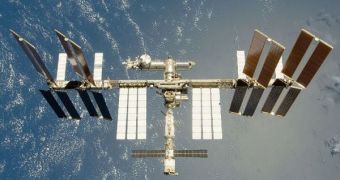According to the presidential panel committee that has just recently finished looking into the activities under development at NASA, extending the lifespan of the International Space Station (ISS) beyond 2015 is key to reaching Mars. The experts, who said that they themselves were surprised by the find, highlight the similarities between a six-month stay on the ISS and a six-month, one-way trip to Mars, in terms of how microgravity affects the human body, Reuters reports.
At this point, the orbital station is scheduled to be dismantled in 2015. However, over the past few years, more and more voices started supporting the idea of keeping the 16-nation, $100-billion project in place until 2020, or maybe even 2025. The presidential panel seems to agree with this conclusion, saying that the scientific value of the ISS is too great to simply dismantle it only five years after its scheduled completion. Work has been progressing on the facility for the last decade, with missions ferrying equipment, new modules and solar arrays to orbit several times per year.
The panel also revealed that the $18-billion budget that NASA was alloted at the moment fell about $3 billion per year short of completing Project Constellation on time. This is disastrous, considering that, after the shuttles are retired at the end of next year, the United States will be left without the capacity to deliver humans to orbit for the first time in NASA's history. American astronauts will have to be ferried up using Russian-built, Soviet-era Soyuz capsules. Discussions with the Chinese, for a place on their Soyuz-based capsules, are also taking place, officials from the American space agency say.
“NASA needs the ISS. A six-month stay on the space station is going to be the best analog we're ever going to have for a six-month microgravity transit to Mars in the future,” ISS program scientist Julie Robinson explained. However, such a trip cannot be seriously considered before 2020, the panel finds, mostly because of lack of knowledge on what such a journey would imply, and also because there are simply insufficient funds for this endeavor.
The committee also revealed that widespread support existed among the nations involved in the ISS for the project to continue. Countries such as Japan and Canada, the Russian Federation and the European Union had invested heavily in the outpost, and they all wanted to see returns on their money, as did the United States, the panel concluded.

 14 DAY TRIAL //
14 DAY TRIAL //